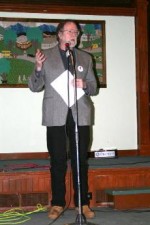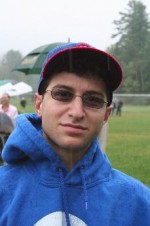Still hoping for peace

Outside the Unitarian Universalist Church on the corner of Cottage and West St. in Rutland, there sits a somber heap of flagstone, cold and immutable against the buttery March sunshine. A sign informs that the cairn represents not only the American soldiers lost in the Iraq War, but also the thousands of Iraqi civilians killed in the fighting.
It is a somber reminder to visitors of why they are gathered.
On March 22, the Student Peace Alliance of Rutland County, SPARC, held a rally to mark the beginning of America’s sixth year of occupation in Iraq and voice their disapproval.
But the true intent, according to Matt Kimball, one of SPARC’s leaders and a Castleton senior, was much broader.
“We’re not even protesting this war, but organized war in general,” he said.
Kimball, along with Dianna Dessette, a fellow SPARC youth organizer and Rutland local, held a similar protest last year on the beginning of the fifth year of the Iraq War, which was seen as a huge success.
“We had over a hundred people come out (last year),” said Kimball in a phone interview prior to Saturday’s event, and he predicted a large turnout for this year’s event as well.
It seems that people were eager to answer the call. Gathering first at the church and then Main Street Park off Route 4, residents from all walks of life arrived, bearing signs, costumes, and effigies.
In flannel and trucker caps, button-covered jackets and fashionably tattered combat-boots, parents and politicians, elderly activists and teens new to dissent all came out, in spite of Vermont’s spring cold, to voice their frustration, their dissidence and their hope.
For many at the event, it was their first taste of political activism. Some, however, like Jane Newton, were old hands. At 76, she has seen her fair share of protests, marches and civil disobedience.
She claimed to have been arrested four times for picketing in attempts to shut down Vermont Yankee, but no court case ever came from the arrests.
“They don’t want little old ladies in jail. Looks bad for them,” she said.
Newton works with the Springfield branch of the Peace & Justice Center, a Vermont non-profit which donated the funding that started SPARC. She said the reason she was protesting war is the same as her reason for going after Vermont Yankee.
“I’m so worried about the world we’re leaving for the next generation,” she said.
Many families came with their children in tow. Sara Stowell, 39, came with her husband and two young children.
Stowell said she has many personal connections to the war, which drove her to be vocal in her dissent. She has a cousin serving in Afghanistan and several friends in the National Guard.
“Because they have children my children’s age, I’m very connected. We forget in the bravado of war that we’re affecting very small people,” she said.
Stowell looks down at her young son while answering questions and speaks a fast string of Spanish. She met her husband in El Salvador she says, while working with human rights groups to aid the injured in that war-torn country. Stowell says she knows first-hand the cost of foolhardy war.
“Countries are changed forever, and it will change the core of ours forever,” she said.
Malini Chestnut-Tangerman, a 14-year-old local, came with her father to the rally, but felt a need to take part in the day’s activities besides familial involvement. She said her interest in political protest was sparked from discussions with her sixth grade teacher, who had served in the military and supported the war.
Malini said she respected the opposing viewpoint of her teacher and others, but disagrees nonetheless.
“I still think peace is the better option,” she said.
The subjects that seemed most consistent with the speakers and attendees included the need for open discussion about the issues and a deep appreciation for the involvement of young people in the peace movement.
In his keynote speech at the Cottage and West St. church, Castleton communication department chair Tom Conroy touched on both sentiments. He spoke of the history of activism within the Unitarian church, of people “who stood here and spoke out against the Spanish-American War, World War One and Two,” and several others.
Conroy said he was hopeful about the youth movement, today’s teens and college students, “who will hopefully put an end to this revolving door of ghosts.”
Likewise, gubernatorial candidate Anthony Pollina, spoke about what he and many of the attendees felt was the oppressive agenda of corporate and big government interests.
“They want you to go home, sit down, and be quiet,” he said.
He praised the turnout of young people at the event, stating that change “starts in rooms like this, with people like you.”
It seems that many of the teens in attendance had taken that message to heart. Again and again from everyone interviewed, whether for the war or against, the protesters felt that dialogue was the road to change and a better future.
Lalita Russ, a graduating high school student, embodied the day’s spirit. She was bright, full of energy against the biting cold outside on Route 4, and convinced of her duty. Like many at the rally, Lalita had been involved for some time with the PJC, offering counterpoints to the military recruiters.
She said that it wasn’t out of disrespect for the military or its service, but to let her peers know that there were other ways, other choices besides the gun. Lalita said that she came to the rally to further that cause, to jar others to think.
“I think people forget that we’re the hope,” she said.





